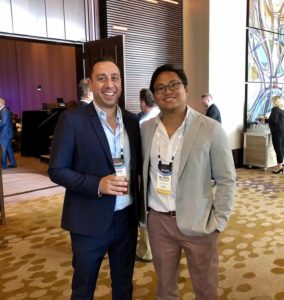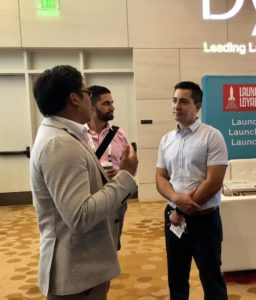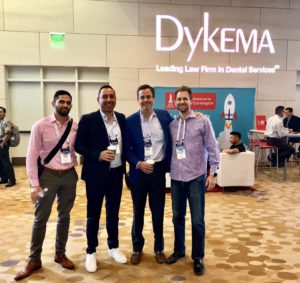
Dr. V shakes hands with host Brian Colao
Private Equity Investments in the DSO Space: A Buyer and Seller’s Perspective
This July, Dykema, leading law firm in the dental industry, hosted their 4th Annual Definitive Conference for Dental Service Organizations in Dallas. Our very own CEO, Dr. Chris Villanueva, spoke on the panel—Private Equity Investments in the DSO Space: A Buyer and Seller’s Perspective. Dr. V spoke alongside MB2’s private equity partner Paul Murphy from Sentinel, hosted by Brian Colao, Director of Dkyema’s DSO Industry group.
The insight of the private equity and business partnership experience from the two different groups and PE firms gave the audience four unique perspectives from both the buyer and seller sides of the journey.
What Do Private Equity Firms Look For in a Dental Group?

Efstathios Maroulis & Dr. V
Paul Murphy said, “A number of factors go into it but I think I’d probably put it into three buckets: culture, infrastructure, and skill set. In the culture, is there a dentist-centric or provider-centric—including hygienists—culture in the business? Is it just a collection of dental clinics that someone’s cobbled together and they’re sort of masquerading as a business? Or is there a true culture from the top down that we can partner with and we can expand? That manifests itself in things like low dentist turnover and long tenure. Those are some of the ways to analyze culture, but a lot of it is that this is a human capital business, so you’ve got to spend time with people in the business and really see if this is the type of culture you want. That also manifests itself in clinical volume. That’s the one thing that we as business people can’t fix, so we have to invest in businesses where we think there’s high clinical volume.
On the infrastructure, if you’re paying a high multiple for a business, it warrants a high multiple if they’ve put the time, effort, and money into building infrastructure. So that’s IT systems, that’s marketing programs, purchasing programs, whatever their growth plan is. Have they put people in? Is that a specific department? Do they have operational procedures that are replicable? That are followed? Or is every clinic kind of doing their own thing?
Then, it’s the skillset. If you’re paying a full multiple for business you’ve got to grow it and have a skill set in a company for growth…is there a true formula for if they’re opening up De Novos? Is it really a function in the company where they have a skill set in identifying locations, doing build outs that we can scale out more? If they’re doing acquisitions, have they developed an actual systematic plan to identify acquisitions, negotiate them, execute them and integrate them? Every acquisition looks great on paper but it’s all about how it’s actually integrated.”
Paul Murphy said, “It sort of comes back to the partnership aspect. When we’re looking at any of these opportunities we really look for a culture in a business that’s dentist-centric. In the case of both Dr. Abramowitz and Dr. Villanueva, they’re dentist owned and dentist run—which is great. But even ones that aren’t and don’t necessarily have—if there’s a dentist-centric culture then we think that’s a blueprint for success. Where the dentists feel like they’re part of the organization. It may just be practicing in their individual clinic, but they have respect and appreciation for the greater organization that they’re apart of and the way their clinics are run and their partnerships with it.
We need to have a partnership with dentists that are running the business and practicing in the business and be collaborative. A culture where decisions can be made and people feel like they have a seat at the table and they understand and respect why decisions are being made. I’m very fortunate to have partnered with great leaders in this industry. One thing about the dental industry is it’s still a young industry. A lot of the leaders in these dental businesses are home-grown, starting from one clinic and then building their way up. When they partner with us, we respect that and we like to find people that respect the experience that we bring too.”

Dr. V & Paul Murphy speak on Dykema DSO Panel
What Sets MB2 Apart From Traditional DSOs?“We are a very provider-centric organization. A lot of the traditional DSOs are geographically restricted to certain markets. We have practices in Soldotna, Alaska; we have practices in Louisiana—because I really invest in my fellow doctors. Not a slight against traditional DSOs, but traditional DSOs view myself as a doctor—strictly as a clinician and a provider. And I reject that fact. I think doctors are leaders, mentors and entrepreneurs. In my organization, we welcome doctors and give them the platform to be all of those things. They can obviously provide care, but they can also own single-sites, multi-sites, invest in hold-co economics, invest in sidecar economics. Everything is open to the providers and that’s what makes us different. A lot of traditional DSOs have large business development capacities with great personnel, our doctor partners are our business development team. Doctors are the tip of the spear when it comes to growth and execution, which is vastly different than traditional DSOs.” –Dr. V
Read more about how MB2 differs from the traditional DSO model.
What Was MB2 Searching For in a Partner?

Dr. V speaks with Dykema DSO conference attendees
Host Brian Colao asked, “In many cases, I would almost argue it’s true you [DSO’s] are doing a favor by relieving the doctor of any non-clinical administrative responsibilities and allowing them to focus on clinical, but in your organization, you think there’s a good benefit for being on the business side?”
Dr. V answered, “It’s a completely different paradigm. A lot of traditional DSOs think they’re doing doctors a favor. As a doctor, I think we’re doing the businesses a favor by allowing them to participate in what we went to school for. My role is simple. I look after the interest of doctors. I want to make sure our organization is always lead by doctors. Businessmen have their seat on the bus, but it’s not leading the organization.
That’s part of the selection process. It’s very telling when you talk to sponsors, and a lot of them will come in like, “Oh, it’s really cute what your doctors have done, but let the big boys take over now.” When they were the ones that actually wanted us. I think ultimately the doctors should take avail of any opportunities in a consolidating market. I think doctors should be the ones making the decisions. I may be the CEO, but I’m a doctor first, and I think finding the right partner that respects that dynamic is what made myself and all my 40-something doctor partners comfortable with taking this leap.”
This is Only the Beginning

Dr. Rahul Joshi, Efstathios Maroulis, Justin Puckett, & Dr. Justin Ramsey
A main topic of the panel was the quickly evolving business model of the dental industry. More DSO’s and group practices are emerging. Paul Murphy believes this is only the beginning of the trend into group practice.
“I think from an investor prospective, the DSO model just makes sense. When I was a kid, every dentist was a middle-aged, white male whose wife did the books and practiced in a solo office. In New England where I was, it was usually in an actual home that had been converted into an office. That model was simple. It was actually illegal to advertise in many states up until the 80s or 90s and it wasn’t as complicated.
It’s a much more complicated business model now—it’s a true direct-to-consumer model. People don’t generally get their dentist from a doctor referral—they get them from advertising. So the business of dentistry is more complicated and more difficult for an individual dentist to run a practice.
Now you’ve got to make investments in digital marketing and search engine optimization (SEO), you’ve got to buy expensive IT systems, invest in the latest equipment, and negotiate with insurance companies—and that’s all very difficult. On the clinical side, there are so many advancements in the clinical aspect with implants and things dentists want and have an opportunity to make a lot more money from if they can improve their skillset. Combining business with clinical makes a lot of sense.
Even though we’re all in the DSO industry and you’re at these conferences we think everything in dentistry has gone to DSO—and we’ve been investing in the DSO industry for 15 years and it’s still less than 20 percent of the market. As long as I’ve been in it, we still think it’s in the early beginnings of the consolidation wave. I think it has been a great sector and it will continue to be a great sector in partnerships between the clinical side and the business side.” – Paul Murphy

